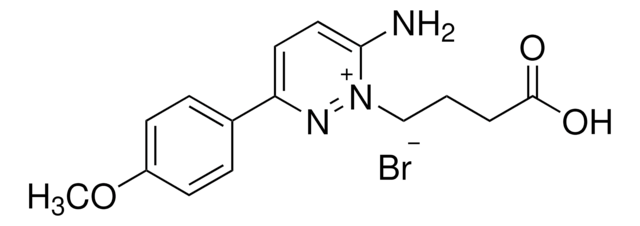165304
D-(–)-2-Amino-5-phosphonopentanoic Acid
≥97% (HPLC), solid, NMDA receptor antagonist, Calbiochem®
Synonym(s):
D-(–)-2-Amino-5-phosphonopentanoic Acid, D-AP5, NMDA Antagonist II, APV, D-APV, 2-APV, D-2-amino-5-phosphonovalerate
About This Item
Recommended Products
product name
D-(–)-2-Amino-5-phosphonopentanoic Acid, Active enantiomer of DL-2-amino-5-phosphonopentanoic acid (AP5) that is a commonly used as a competitive NMDA receptor antagonist.
Quality Level
assay
≥97% (HPLC)
form
solid
manufacturer/tradename
Calbiochem®
storage condition
OK to freeze
desiccated (hygroscopic)
protect from light
color
white
solubility
dilute aqueous base: 1 mg/mL
water: 1 mg/mL
shipped in
ambient
storage temp.
2-8°C
InChI
1S/C5H12NO5P/c6-4(5(7)8)2-1-3-12(9,10)11/h4H,1-3,6H2,(H,7,8)(H2,9,10,11)/p-2/t4-/m1/s1
InChI key
VOROEQBFPPIACJ-SCSAIBSYSA-L
General description
Biochem/physiol Actions
NMDA receptor antagonist
Warning
Reconstitution
Other Notes
Schulte, M.K., et al. 1994. Brain Res. 649, 203.
Davis, S., et al. 1992. J. Neurosci. 12, 21.
Legal Information
Storage Class
11 - Combustible Solids
wgk_germany
WGK 3
flash_point_f
Not applicable
flash_point_c
Not applicable
Certificates of Analysis (COA)
Search for Certificates of Analysis (COA) by entering the products Lot/Batch Number. Lot and Batch Numbers can be found on a product’s label following the words ‘Lot’ or ‘Batch’.
Already Own This Product?
Find documentation for the products that you have recently purchased in the Document Library.
Customers Also Viewed
Our team of scientists has experience in all areas of research including Life Science, Material Science, Chemical Synthesis, Chromatography, Analytical and many others.
Contact Technical Service








